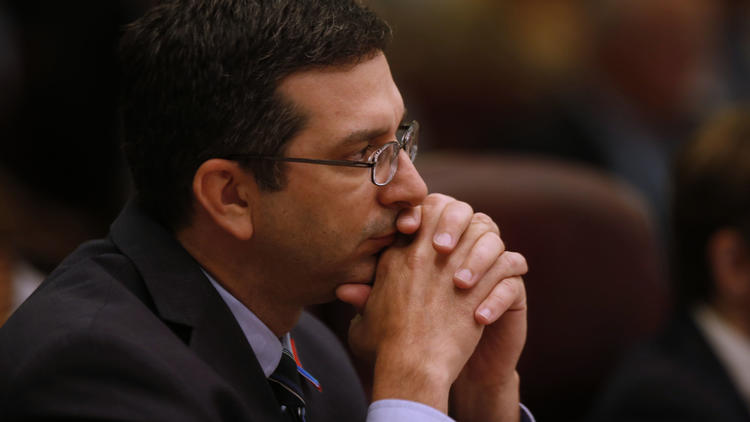As the U.S. Justice Department asks Chicago to address deep flaws in police officers’ use of force, a group of aldermen is accusing Mayor Rahm Emanuel‘s Law Department of enabling the misconduct and is asking federal authorities to investigate.
The City Council’s Progressive Caucus sent a letter to U.S. Attorney General Loretta Lynch last week, asking her to launch a federal review of the Law Department’s federal civil rights litigation division, which has been sanctioned eight times during Emanuel’s tenure for withholding possible evidence in police misconduct lawsuits, which it defends.
“It looks as if the cover-up extends not only to leadership of the Police Department but to the corporation counsel and our lawyers as well,” Ald. Roderick Sawyer, 6th, said in an interview. “I don’t want that to happen.”
Lynch was in Chicago on Friday to deliver the report, a document that blistered the Chicago Police Department for years of poor training of officers who all too often use excessive force, most often against the city’s minority residents. The city then routinely fails to adequately investigate problem officers and punish them, the U.S. Department of Justice report said, creating a culture where abuse is tolerated and trust in the department is severely damaged.
The 11-member caucus lashed out at the Law Department in a letter for its role in the erosion of the public’s faith in both the police and the local justice system, calling on Emanuel to address a pattern of problems with how city lawyers handle potential evidence in police-related lawsuits.
The request comes a week after a federal judge sanctioned the city for failing to turn over records involving the fatal police shooting of a 20-year-old man in 2012. In her sharply worded ruling, U.S. Judge Joan Gottschall faulted the city for acting in “bad faith” and blasted a “cavalier attitude” toward discovery, the legal process that allows the two sides in a lawsuit to uncover relevant facts through the exchange of documents, taking depositions and other disclosures.
When the process breaks down, plaintiffs can find themselves at a disadvantage, their lawyers uncertain they are working with all of the evidence. Such failures also can prevent the public from fully understanding the circumstances surrounding alleged police misconduct incidents because most of the facts stay hidden until and unless they’re aired in court.
“We rely on the Law Department all the time to lay out the truth, and we don’t get it,” said Ald. Scott Waguespack, 32nd, chairman of the progressive caucus. “There’s a pattern of obfuscation and there’s a pattern of concealment that runs up through the Law Department and the mayor’s office.”
The caucus called on the Law Department to “clean house,” which Waguespack said would mean the departure of Corporation Counsel Stephen Patton, whom Emanuel appointed to be the city’s top lawyer in May 2011. Patton and Waguespack have clashed over several issues in recent years, including police reform, parking meter contracts and the city’s initial efforts to conceal the video of a white police officer shooting and killing 17-year-old Laquan McDonald.
The McDonald video’s release — and the furious reaction to it — prompted the Department of Justice to investigate the Police Department’s policies and practices. The review, however, did not extend to the Law Department, though the 164-page report faulted the Law Department for its practice of keeping details of settlements in police misconduct lawsuits from the public.
“The City’s limited release of information regarding settlements further contributes to public distrust and the perception that the City wishes to keep officer misconduct concealed from public scrutiny,” the federal report states.
A Law Department spokesman disputed the Justice Department’s finding on the department.
“The Law Department is completely open and transparent with all settlement documents, including settlements of cases that allege police misconduct,” spokesman Bill McCaffrey wrote in an email. “Any suggestion otherwise is incorrect and not supported by the facts.”
Waguespack said the Law Department’s leadership bears much of the responsibility for problems.
“I think he should resign,” Waguespack said of Patton. “But the mayor doesn’t tell people to resign until it’s politically unfeasible for him.”
Emanuel has said the sanctions are “unacceptable” and plaintiffs “deserve better,” but that the Law Department has instituted reforms to ensure they won’t be repeated. He also issued a statement staunchly defending Patton late Friday.
“Few people in this administration have worked harder to implement transformational change in our police accountability systems than Steve Patton,” Emanuel spokesman Adam Collins wrote in an email. “From helping to draft the police accountability ordinance and recruiting national experts on police training, to implementing significant reforms within the law department and providing guidance on all legal issues, Steve continues to play a key leadership role in the progress of our city.”
Gottschall’s ruling marked the city’s third sanction by a federal judge in a police misconduct lawsuit in six months, and the eighth since Emanuel took office in 2011. It also renewed questions about how the Law Department handles potential evidence in such cases, which are often high-profile, controversial and potentially costly for taxpayers.
“We recognize the seriousness of these sanctions,” the caucus wrote in the letter, dated Jan. 10, “and they are directly related to the reforms your office will be recommending.”
A Tribune investigation last year that analyzed nearly 450 cases alleging police misconduct since Emanuel took office found that a federal judge had to order the city to turn over potential evidence in nearly 1 of every 5 cases.
The issue came to a head in January 2016, when a federal judge sanctioned one city lawyer for intentionally concealing evidence and another for failing to make a reasonable effort to locate key records in a lawsuit stemming from the fatal 2011 police shooting of Darius Pinex.
The judge took the rare step of tossing out a jury verdict in favor of the city and ordering a new trial.
In the days following the ruling, Emanuel tapped former U.S. Attorney Dan Webb to lead a review of the Law Department’s handling of police misconduct cases. Webb found no pattern of intentional misconduct among city attorneys, but he also recommended more than 50 reforms to address problems in the office. Patton instituted those reforms, along with several other measures he made immediately after the Pinex ruling.
The city settled the case with Pinex’s family last month for $2.37 million and agreed to pay an additional $1 million to the plaintiff’s attorneys in the case.
Federal judges also have fined the city more than $350,000 for discovery violations in other police misconduct cases over the past six years. The penalties and the Pinex settlement were paid with taxpayer dollars, which the progressive caucus says makes Law Department reforms even more urgent.
“We need to know what the Emanuel administration plans to do to address this before taxpayers get hit with even more lawsuits,” Sawyer said.







